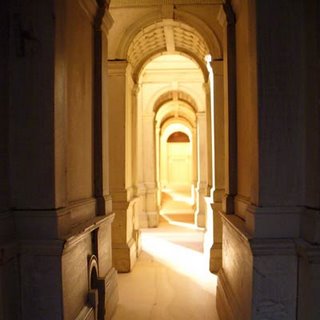The following is an exposition sent to me by my old R.E. teacher of "Découverte du secret de la Salette" by René Laurentin and Michel Corteville published in 2002, with additional reflections on the implications of the Secrets of La Salette for England. I know this is a Scottish blog but perhaps St John Vianney was using 'Angleterre' imprecisely (as the French tend to do) and meant to include Scotland as well... If you want the book, follow the title-link to Amazon.fr.
A SHORT THESIS BY JAMES FOSTER
The basic facts surrounding the events at La Salette in September 1846 have been detailed in the relevant literature since that time, and though they are not well known these days in comparison with Lourdes or Fatima, I do not propose to rehearse them fully here. Suffice it to say that the Bishop of Grenoble recognised the authenticity of a single apparition of the Virgin Mary to two children, Melanie Calvat and Maximin Giraud in that same year. Our Lady of La Salette, as she was thence called, asked the children to make her message known "to all my people". As at Lourdes and Fatima the message was a call to prayer and repentance. It included a reproach for the people's failure to observe the Sabbath, and the misuse of the Lord's name. Recent events including the failure of the potato crop were related to the sins of the people but Our Lady also promised a better future if only the people would change. She also confided two secrets to the children, one to Melanie and one to Maximin. Despite the best efforts of countless persons including the clergy the children resolutely refused to divulge their secrets. Finally in July 1851, at the request of Pope Pius IX, the children agreed to write down their secrets in the presence of Bishop de Bruillard and two witnesses. The witnesses, who countersigned the statements to support their authenticity, were C.de Taxis and B.Dausse in the case of Maximin, and B.Dausse and M.Auvergne in the case of Melanie. The messages were then sealed and sent to the Pope who decided not to reveal them. Until 2002 when (see below) the authentic secrets were finally published, all that was known of their contents was the fact that Melanie's secret contained the words "infallibly", "soiled" and "antichrist". This was known because Melanie had asked the bishop how to spell these words. Contrary to what has often been claimed, the full texts of the authentic secret were never revealed by the Vatican. Indeed in July 1915 Cardinal de Cabrieres who firmly believed in the authenticity of the apparitions stated that the secret was said to be no longer at the Vatican. (Le Hidec "Les Secrets de La Salette" p164-167).
False Texts of the Secret
In the decades following the apparition a number of versions of the secret were published, including the version published in Italy in 1879 by Melanie Calvat herself. This text, which was so long that it had to be published as a pamphlet was very apocalyptic in tone and included dire predictions for the world and trenchant criticism of the clergy. It included the dramatic claim "Rome will lose the faith and become the seat of the antichrist". It was used by anti-clericals and Freemasons to attack the Church. It is still used today by those "traditionalists" who are currently in schism with Rome. The church authorities have never accepted these versions of the secret as authentic. After their publication they were placed on the Index of Forbidden books and Melanie was privately cautioned for her behaviour.
At this point it is necessary to mention the two views of Melanie that subsequently emerged. Her devotees including a number of clergy, whom she attracted to her cause at the time, see her as one who was completely faithful in her mission, a mission which they believe continued after the initial events of September 1846. She became a great mystic and visionary who suffered great frustrations at the hands of the Church authorities. This was her peculiar cross and vocation. All her claimed revelations are to be trusted including the rejected secret of 1879. The other view is that by the time Melanie published the so called Secret of La Salette, having failed in her vocation as a Carmelite nun and been dispensed from her vows by the Holy Father, she had become a pseudo-mystic, obsessed with apocalyptic literature and embittered with respect to the Church authorities who had consistently refused to accede to her unreasonable demands. The secret was not a true reflection of what Our Lady said to her, but an expression of her own ideas and feelings. The Bishop of Grenoble, who suffered successive embarrassments while trying to defend Melanie, found her "wilful" and defiant of authority. It was with considerable foresight that he declared publicly in 1851 that the mission of the shepherd children had ended and that the matter was now in the hands of the Church. He did this to end Melanie's pretensions to further and continuous revelations. Melanie was said to provoke in those who had to deal with her not so much anger, but rather pity. I do not propose to attempt to resolve the issue of which of these characters represents the "true Melanie", but the falsity of the 1879 version is evident for various reasons including
- Its length which filled several pages of a pamphlet. The true secret barely filled three sides
- It makes reference to specific events said to be going to occur in the nineteenth century but which never in fact occurred. For example the antichrist did not appear "around 1865" or have we just failed to recognise him? Nor did he lead armies in wars which were fought in the 1880's. (Note how the phrase about Rome becoming the seat of the antichrist is removed from this context by those who would use it to justify present attacks on the Vatican).
- The publication in 2002 of the secret Melanie wrote for the Pope in 1851 allows us to make a comparison with the 1879 version and it quickly becomes apparent that there is little resemblance between the two. The true secret is very similar to the message of Fatima seen in its entirety. It is not overtly apocalyptic in tone and lacks the damning criticism of the clergy and religious found in Melanie's 1879 version. The phrase "Rome will lose the faith and become the seat of the antichrist" is not present. Like Fatima it is a message of hope, especially when read together with Maximin's secret.
The True Secret of La Salette
Unfortunately the controversy surrounding Melanie Calvat and especially the banning of the so called secret of La Salette led to confusion among the faithful. Did the Church approve of La Salette or not? Church statements re-iterating the acceptance of the original apparition and message, and that it was only Melanie's later statements that were banned failed to halt the decline of La Salette as a major Marian shrine and place of pilgrimage. So much so that when the authentic secrets were first published in 2002 the event passed almost unnoticed, unlike the earlier release of the Third Secret of Fatima which made national headlines and was widely discussed in the Catholic press at the time. The writings of Maximin and Melanie were supposed lost or at least buried so deep in the Vatican archives that they could never be found! However, a French priest Fr.M.Corteville accessed the archive in 1999 whilst researching La Salette and discovered the long forgotten secrets. These were subsequently published in France in 2002 in a book co-authored with R. Laurentin called "Decouverte du secret de La Salette". The book has not as yet been translated into English but reviews of the book have appeared together with transcripts of the texts of the secrets in French and English, and facsimiles of the original letters. The facsimiles include the envelopes in which the secrets were placed and the authenticating signatures are clearly visible. I see no reason at all to doubt their authenticity though as yet I have been unable to obtain a copy of the original book in French, and so I'm unable therefore to offer any information as to the exact circumstances of their publication. However, unlike the publication of the Third Secret of Fatima, their publication would not appear to be an official release by the Vatican.
Facsimiles and texts of the secrets in French and English
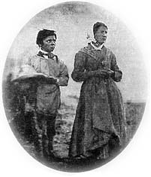
(July 3-6, 1851)
The two writings of July 1851 agree on the essential, but differ in their developments and even their tonality: the secret of Maximin is shorter, simpler, and less serious.
1. Maximin's Secret, July 3 1851
Maximin wrote his Secret at the bishop's palace, in front of Bishop de Bruillard's people, perfectly unconcerned, on July 3 in the evening. He was asked to rewrite it again because of spots of ink. The soiled autograph was burnt. Lastly, Mr. Dausse handed the Secret to Bishop de Bruillard, to be sure of its importance before affixing his own seal to it, and to send it to the pope. The sealed envelope was countersigned by two witnesses, at 7.00pm.
Maximin's original Secret.
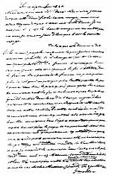
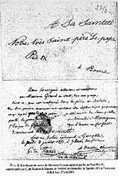
In the thesis (of Fr. Corteville), the Secrets are published in a rigorously exact way, line by line, with the punctuation and spelling mistakes of the young shepherds, for who writing in French was an exploit. For this book intended for a large audience, we present the literal edition, but with the spelling, the punctuation and the lay-out which make it more readable.
Like all the prophecies, this one is a call to vigilance. It warns for the future, without satisfying curiosity. The seers interpret as they can the picturesque terms that they know not. They extrapolate, confuse the logical and temporal plans.
FRENCH:
Le 19 septembre 1846, nous avons vu une belle Dame. Nous n'avons jamais dit que cette dame fut la Sainte Vierge mais nous avons toujours dit que c'était une belle Dame.
Je ne sais pas si c'est la Sainte Vierge ou une autre personne. Moi, je crois aujourd'hui que c'est la sainte Vierge.
Voila ce que cette Dame m'a dit:
"Si mon peuple continue, ce que je vais vous dire arrivera plus tôt , s'il change un peu, ce sera un peu plus tard.
La France a corrompu l'univers, un jour elle sera punie. La foi s'éteindra dans la France: trois parties de la France ne pratiqueront plus de religion, ou presque plus, 1'autre la pratiquera sans bien la pratiquer. Puis, après [cela], les nations se convertiront, la foi se rallumera partout.
Une grande contrée dans le nord de l'Europe, aujourd 'hui protestante, se convertira: par l'appui de cette contrée toutes les autres contrées du monde se convertiront.
Avant que tout cela arrive, de grands troubles arriveront, dans l'Eglise, et partout. Puis, après [cela], notre Saint-Père le pape sera persecuté. Son successeur sera un pontife que personne [n'] attend.
Puis après [cela], une grande paix arrivera, mais elle ne durera pas longtemps. Un monstre viendra la troubler.
Tout ce que je vous dis là arrivera dans l'autre siècle, [au] plus tard aux deux millle ans."
Maximin Giraud
(Elle [m'] a dit de le dire quelque temps avant).
Mon très Saint Père, votre sainte bénédiction à une de vos brebis,
Grenoble, le 3 juillet 1851.
ENGLISH:
On September 19, 1846, we saw a beautiful Lady. We never said that this lady was the Blessed Virgin but we always said that it was a beautiful Lady.
I do not know if it is the Blessed Virgin or another person. As for me, I believe today that it is the Blessed Virgin. Here is what this Lady said to me:
"If my people continue, what I will say to you will arrive earlier, if it changes a little, it will be a little later.
France has corrupted the universe, one day it will be punished. The faith will die out in France: three quarters of France will not practice religion anymore, or almost no more, the other part will practice it without really practicing it. Then, after [that], nations will convert, the faith will be rekindled everywhere. A great country, now Protestant, in the north of Europe, will be converted; by the support of this country all the other nations of the world will be converted.
Before all that arrives, great disorders will arrive, in the Church, and everywhere. Then, after [that], our Holy Father the Pope will be persecuted. His successor will be a pontiff that nobody expects.
Then, after [that], a great peace will come, but it will not last a long time. A monster will come to disturb it.
All that I tell you here will arrive in the other century, at the latest in the year two thousand."
Maximin Giraud
(She told me to say it some time before.)
My Most Holy Father, your holy blessing to one of your sheep.
Grenoble, July 3,1851.
Mélanie's original Secrets.
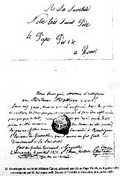
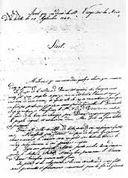
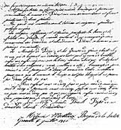
2. Mélanie's Secret, July 6,1851
She wrote the Secret a first time, on July 3, in Corenc, at the Sisters of Providence. She sealed it at 10.00 am, and it was carried at the Bishop's House. The following day, she said she had not expressed herself well on the misfortunes which were to befall to two cities (Paris and Marseilles): they appeared simultaneous, whereas they were successive. Canon Rousselot made her rewrite her Secret, on July 6, then the engineer Dausse led her to the Bishop's House, where Bishop of Bruillard read the document before sealing it.
FRENCH:
J.M.J.
secret que m'a donné la Sainte Vierge sur la Montagne de la Salette le 19 septembre 1846
Secr[e]t
Mélanie, je vais vous dire quelque chose que vous ne direz à personne:
Le temps de la colère de Dieu est arrivé!
Si, lorsque vous aurez dit aux peuples ce que je vous ai dit tout à 1'heure, et ce que je vous dirai de dire encore, si, après cela, ils ne se convertissent pas, (si on ne fait pas pénitence, et si on ne cesse de travailler le dimanche, et si on continue de blasphémer le Saint Nom de Dieu), en un mot, si la face de la terre ne change pas, Dieu va se venger contre le peuple ingrat et esclave du démon.
Mon Fils va faire éclater sa puissance! Paris, cette ville souillée de toutes sortes de crimes, périra infailliblement. Marseille sera détruite en peu de temps. Lorsque ces choses arriveront, le désordre sera complet sur la terre. Le monde s'abandonnera à ses passions impies.
Le pape sera persecuté de toutes parts: on lui tirera dessus, on voudra le mettre à mort, mais on ne lui pourra rien, le Vicaire de Dieu triomphera encore cette fois[-là].
Les prêtres et les religieuses, et les vrais serviteurs de mon Fils seront persécutés, et plusieurs mourront pour la foi de Jésus-Christ.
Une famine règnera en même temps.
Après que toutes ces choses seront arrivées, beaucoup de personnes reconnaîtront la main de Dieu sur elles, se convertiront, et feront pénitence de leur péchés.
Un grand roi montera sur le trône, et règnera pendant quelques années. La religion refleurira et s'étendra par toute la terre et la fertilité sera grande, le monde content de ne manquer de rien recommencera ses désordres, abandonnera Dieu, et se livrera à ses passions criminelles.
[Parmi] les ministres de Dieu, et les Epouses de Jésus-Christ, il y en a qui se livreront au désordre, et c'est ce qu’il y aura de [plus] terrible.
Enfin, un enfer règnera sur la terre. Ce sera alors que l’Antéchrist naîtra d'une religieuse: mais malheur à elle! Beaucoup de personnes croiront à lui, parce qu'il se dira venu du ciel, malheur à ceux qui le croiront!
Le temps n'est pas éloigné, il ne se passera pas deux fois 50 ans.
Mon enfant, vous ne direz pas ce que je viens de vous dire. (Vous ne le direz à personne, vous ne direz pas si vous devez le dire un jour, vous ne direz pas ce que cela regarde), enfin vous ne direz plus rien jusqu’à ce que je vous dise de le dire!
Je prie Notre Saint Père le Pape de me donner sa sainte bénédiction.
Mélanie Mathieu, bergère de La Salette
Grenoble 6 juillet 1851
J.M.J.+
ENGLISH:
on the Mountain of La Salette on September 19, 1846
Secr[e]t.
Mélanie, I will say something to you which you will not say to anybody:
The time of the God's wrath has arrived!
If, when you say to the people what I have said to you so far, and what I will still ask you to say, if, after that, they do not convert, (if they do not do penance, and they do not cease working on Sunday, and if they continue to blaspheme the Holy Name of God), in a word, if the face of the earth does not change, God will be avenged against the people ungrateful and slave of the demon.
My Son will make his power manifest! Paris, this city soiled by all kinds of crimes, will perish infallibly. Marseilles will be destroyed in a little time. When these things arrive, the disorder will be complete on the earth, the world will be given up to its impious passions.
The pope will be persecuted from all sides, they will shoot at him, they will want to put him to death, but no one will not be able to do it, the Vicar of God will triumph again this time.
The priests and the Sisters, and the true servants of my Son will be persecuted, and several will die for the faith of Jesus-Christ.
A famine will reign at the same time.
After all these will have arrived, many will recognize the hand of God on them, they will convert, and do penance for their sins.
A great king will go up on the throne, and will reign a few years. Religion will re-flourish and spread all over the world, and there will be a great abundance, the world, glad not to be lacking nothing, will fall again in its disorders, will give up God, and will be prone to its criminal passions.
[Among] God's ministers, and the Spouses of Jesus-Christ, there will be some who will go astray, and that will be the most terrible.
Lastly, hell will reign on earth. It will be then that the Antichrist will be born of a Sister, but woe to her! Many will believe in him, because he will claim to have come from heaven, woe to those who will believe in him!
That time is not far away, twice 50 years will not go by.
My child, you will not say what I have just said to you. (You will not say it to anybody, you will not say if you must say it one day, you will not say what that it concerns), finally you will say nothing anymore until I tell you to say it!
I pray to Our Holy Father the Pope to give me his holy blessing.
Mélanie Mathieu, Shepherdess of La Salette, Grenoble, July 6, 1851.
J.M.J.+
(From Découverte du secret de La Salette, R. Laurentin et M. Corteville, Fayard, 2002, pp. 46-49)
The Thesis.
The newly discovered secret which Our Lady gave to Maximin in September 1846 contains the phrase "A great country, now Protestant, in the north of Europe, will be converted; by the support of this country all the other nations of the world will be converted."
I wish to suggest that in all probability this prophecy refers to England. In support of this view I would like to offer three arguments
1. No other country fits the description so well as England. It is in the North of Europe, is Protestant, and was certainly regarded as great (I take this to mean "major power") at the time. What other country could better fit that description at that time?
2. The country of the prophecy must somehow be in a position to support the conversion of the world. This means communication, to which language whether spoken or written is central. English is now undeniably the new universal language of the world. This gives this country a great advantage in the communication of ideas. Of course, other countries speak English as their national language, but none of them are in Northern Europe and Protestant.
3. There is the prophecy of the Cure of Ars concerning the conversion of England, a prophecy which he made in the context of a discussion concerning La Salette with an English Bishop. It is well known that the Cure became devoted to Our Lady of La Salette. He did experience a period of doubt, for reasons which remain unclear, but prayed for and received the reassurance he sought that the apparitions were genuine. Thenceforth he told people that they should believe in La Salette. Archbishop William Ullathorne of Birmingham went to La Salette in May of 1854 to verify for himself the events that had occurred there. He was able for example to verify that there had indeed been a failure of the potato crop in the autumn of 1846 which led to widespread hunger in the mountainside areas. He went to see the Cure of Ars and as he was explaining the need for the Cure to pray for English Catholics who were suffering so much
"Suddenly he interrupted me by opening those eyes-cast into shadow by their depth, when listening or reflecting - and streaming their full light upon me in a manner I can never forget, he said, in a voice as firm and full of confidence as though he were making an act of faith… 'I believe that the Church in England will recover her ancient splendour'. I am sure he firmly believes this, from whatever source he has derived the impression". (Archbishop Ullathorne quoted in Trochu's "The Cure of
Ars".)
From whatever source indeed had the Cure derived this impression? We know that Maximin visited the Cure and that the two spent some time in conversation together. Or was it Our Lady of La Salette herself who made this known to the Cure and wished thereby to give comfort to the concerned English bishop? Let us renew our hope and pray with confidence...
O Blessed Virgin Mary, Mother of God and our most gentle Queen and Mother, look down with mercy upon England your dowry, and upon us all who greatly hope and trust in you. By you it was that Jesus, our Saviour and hope, was given to the world; and he has given you to us that we may hope still more. Plead for us your children, whom you did receive and accept at the foot of the Cross, O sorrowful Mother. Intercede for our separated brethren, that with us in the one true fold they may be united to the Chief Shepherd, the Vicar of your Son. Pray for us all, dear Mother, that by faith fruitful in good works we may all deserve to see and praise God, together with you in our heavenly home.
Amen
Feel free to circulate this to whomever you choose. Any criticisms or comments welcome.












